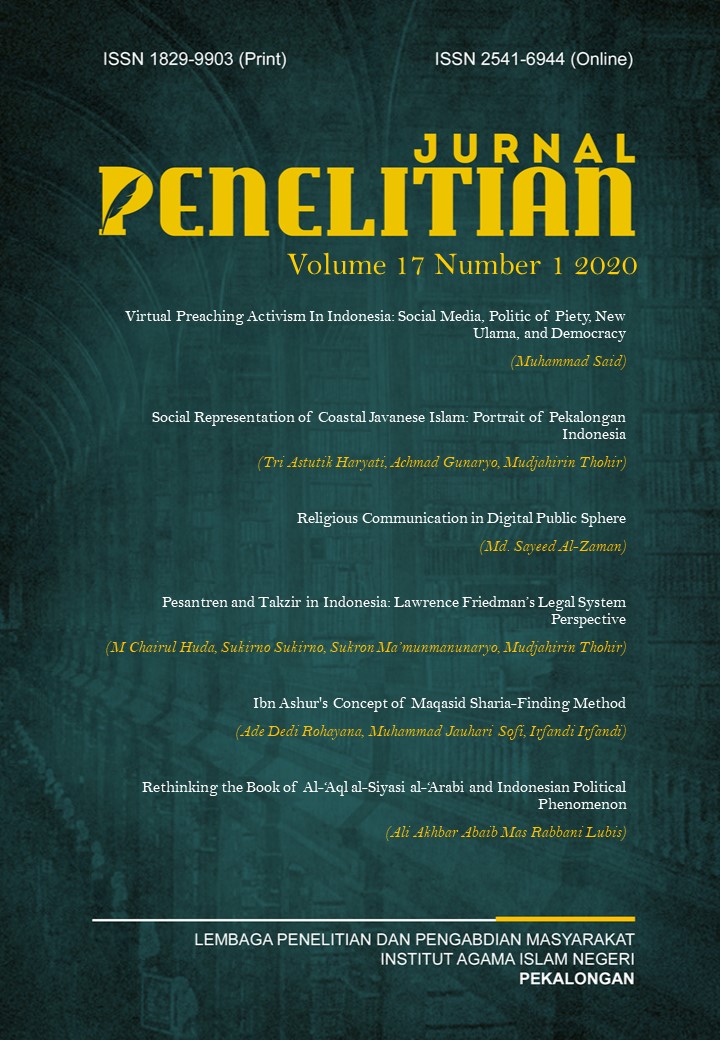Rethinking the Book of Al-‘Aql al-Siyasi al-‘Arabi and Indonesian Political Phenomenon
Main Article Content
Abstract
This article focuses on al-‘Aql al-Siyasi al-‘Arabi’s work and its relevance. It also touches the political
phenomenon in Indonesia during 2016-2019 concerning ““NKRI Bersyariah (Sharia Republic of
Indonesia Unitary State)” discourse supported by FPI and “khilafah” discourse supported by HTI. The
research method employed was qualitative one involving library research viewed from Pierre Bourdieau’s
perspective on habitus, field and distinction, and helped with interactive model of data analysis encompassing
data reduction, data display, and conclusion drawing/verifying. The result shows that al-Jabiri views
qabilah, ghanimah and aqidah as the habituated keywords since pre-Islam times. The temperament was
manifested into the fighting for realizing the ideologies (aqidah) of “NKRI bersyariah” initiated by FPI
qabilah, and “khilafah” (transnational) initiated by HTI qabilah. These ideologies basically are the
capitalism movement trading Islam (ghanimah) to interest group. The incarnation of al-Jabiri’s terminology
can be relevant to Indonesian political phenomenon.
Article Details

This work is licensed under a Creative Commons Attribution 4.0 International License.

This work is licensed under a Creative Commons Attribution 4.0 International License.
References
Abbas, N. (2015). Al-Jabiri Dan Kritik Nalar Arab (Sebuah Reformasi Pemikiran Islam).
Jurnal Aqidah-Ta 1(1):163–85.
Abdullah. (2013). “Kritik Nalar Arab: Tinjauan Kritis Atas Pemikiran Muhammad ‘Abid
Al-Jabiri. Jurnal Diskursus Islam 1(1):114–26.
Abdullah, A. (2001). Al-Ta’wil Al-‘Ilmi: Kearah Perubahan Pradigma Penafsiran Kitab Suci.
Al-Jami’ah 39(2):359–91.
Al-Jabiri, M. A. (2000). Post Tradisionalisme Islam. edited by Ahmad Baso. Yogyakarta: LKiS.
___________. (2000). Al-‘Aql Al-Siyasi Al-‘Arabi: Muhaddidatuhu Wa Tajalliyatuhu. Beriut:
Markaz Dirasat al-Wahidah al-‘Arabiyah.
___________. (2004). Bunyah Al-‘Aql Al-‘Arabi: Dirasah Tahliliyah Naqdiyyah Li Nuzhum AlMa’Arif Fi Tsaqafah Al-‘Arabiyyah. Beriut: Markaz Dirasat al-Wahidah al-‘Arabiyah.
___________. 2009. Takwin Al-‘Aql Al-‘Arabi. Beriut: Markaz Dirasat al-Wahidah al-
‘Arabiyah.
Arfan, A. (2010). Fiqh Al-Siyasah Al-Jabiri: Analisi Kitab Al-‘Aql Al-Siyasi Al-’Arabi (Nalar
Politik Arab). Dejure: Jurnal Syariah Dan Hukum 2(1):95–108.
Arismunandar, S. ed. (2019). NKRI Bersyariah Atau Ruang Publik Yang Manusiawi? Tanggapan
Pakar Terhadap Gagasan Denny JA. Cerah Budaya Indonesia.
As’ad, T. (2012). Kritik Nalar Islam Arab (Telaah Nalar Kritis Epistmologi Moh Abid AlJabiri. Al-‘Adalah 16(2):169–82.
Aziz, J. A. (2015). Pemikiran Politik Islam Muhammad ‘Abid Al-Jabiri: Telaah Terhadap
Buku Al-‘Aql Al-Siyasi Al-’Arabi: Muhaddidatuh Wa Tajalliyatuh. Miqot
XXXIX(1):110–27.
Azra, A. (2016). Transformasi Politik Islam:Radikalisme, Khilafatisme, Dan Demokrasi. Jakarta:
Prenadamedia Group.
Badan Pusat Statistik. (2017). Buku Informasi Statistik Tahun 2017.
Bourdieu, P. (1977). Outline of a Theory of Practice. London: Cambridge University Press.
_________. (1984). Distinction: A Social Critique of the Judgment of Taste,. edited by T. R. Nice.
Cambridge, Mass: Harvard University University Press.
_________. (1993). The Field of Cultural Producion: Essay on Art and Leisure. edited by Trans.
Randar Jhonson. New York: Columbia University Press.
Braaten, C E. n.d. History and Hermeneutics. Philadelphia: The Westminster Press.
Emmanuel, K. & Clark M. (2006). Hizb Ut-Tahrir Al-Islami: Evaluating the Threat Posed
by a Radical Islamic Group That Remains Nonviolent. Terorism and Political Violence
(2):315–34.
FPI. (2019). Milad FPI 21.
Haryatmoko. (2016). Membongkar Rezim Kepastian; Pemikiran Kritis Post-Strukturalis.
Yogyakarta: PT Kanisius.
Juliansyahzen, M. I.. (2019). Rekonstruksi Alar Arab Kontemporer Muhammad ‘Abed Al-Jabiri. Indonesian Journal of Islamic Law 1(2):16–39.
Lubis, A. A. A. M. R.. (2020). Politik Ruang NKRI: BPUPKI Sampai Majelis Konstituante.
Shar-E: Jurnal Ekonomi Hukum SyariahJurnal Kajian Ekonomi Hukum Syariah 6(1):33–42.
Maarif, A. S. (1985). Islam an Masalah Kenegaraan. Jakarta: LP3ES.
Matthew B. M., A.M. Huberman, & Johnny S. (2014). Qualitative Data Analysis: Methods
Sourcebook. Third edit. Thousand Oaks, California: SAGE Publications, Inc.
Muhtadi, B. (2019). Populisme, Politik Identitas, Dan Dinamika Elektoral: Mengurai Jalan Panjang
Demokrasi Prosedural. Malang: Intrans Publishing.
Nashir, H. (2013). Islam Syariat: Reproduksi Salafiyah Ideologis Di Indonesia. Bandung: Mizan.
Nasution, S. (1996). Metode Penelitian Naturalistik Kualitatif. Bandung: Tarsito.
Ngatawi, A. (2013). Gerakan Islam Simbolik: Politik Kepentingan FPI. Yogyakarta: LKiS.
Osman, M. N. M. & Waikar, P. (2018). Fear and Loathing: Uncivil Islamism and
Indonesia's Anti-Ahok Movement. Southeast Asia Program Publictions at Cornell University,
(106), 89-109.
________________. (2020). Reviving the Caliphate in the Nusantara: Hizbut Tahrir
Indonesia’s Mobilization Strategy and Its Impact in Indonesia, Terrorism and Political
Violance. Routledge 2:601–22.
Palmer, R. E. (1969). Hemeneutics: Interpretation Theory in Schleiemacher, Dithey, Heidegger and
Gadamer. Evanston: Nortwestern University Press.
Pimpinan Pusat Muhammadiyah. (2015). Negara Pancasila Sebagai Darul Ahdi Wa Syahadah.
Makassar: Muktamar Muhammadiyah Ke-47.
Rahman, F. (1982). Islam and Modernity, Transformation of an Intellectual Tradition. Chichago and
London: University Press.
Ritzer, G &. Douglas J. G. (2005). Teori Sosiologi Modern. Cet ke-III. edited by T. Alimandan.
Jakarta: Kencana.
Rofiq, M. (2017). Arab Political Reasoning: Muhammad Abid Al-Jabiri’s Contribution for
Understanding Crisis of Politics in the Arab World. Indonesian Journal of Islam and
Muslim Societies 7(1):55–76.
Rosyid, M. (2015). Muktamar 2015 Dan Politik NU Dalam Sejarah Kenegaraan. Yudisia
(1).
Syamsudin, S. (2017). Transformative Readings of Sacred Schriptures: Christians and Muslims in
Dialogue. edited by and A. H. G. (Ed) Sinn, Simone, Dina El Omari. German: The
Lutheran World Federation.
__________. (2017). Ma’na-Cum-Maghza Approach to The Qur’an: Interpretation of Q.
:51. in International Conference on Qur’an and Hadith Studies (ICQHS 2017), Volume 137.
Advances in Social Science, Education and Humanities Ressearch (ASSEHR).
Wilson, I. (2015). Resisting Democracy: Front Pembela Islam and Indonesia’s 2014
Elections. Institute of Southeast Asian Studies 1–8. Retrieved
(https://www.researchgate.net/publication/282002745).
Yusdani. (2011). Nalar Politik Kenegaraan Dalam Islam (Studi Atas Pemikiran Muhammad
Abid Al-Jabiri). Analisis XI(1):131–58.
Zaid Eyadat. et al. (2018). Islam, State, and Modernity: Mohammed Abed Al-Jabri and the Future of
the Arab World. edited by M. H. Zaid Eyadat. Francesca M. Corrao. U.S.A, New York:
Palgrave Macmillan US.
Zohdi, A. (2017). Islamic Scientific Epistemology in Al-Jabiri Perspective. International
Journal of Linguistics, Literature and Culture 3(5):26–35.

